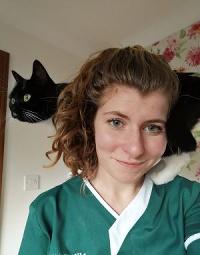The RCVS Knowledge team talk about anxiety this Mental Health Awareness Week
15 May 2023
*This article discusses anxiety and other sensitive topics*
Mental Health Awareness Week, organised by the Mental Health Foundation, takes place each May to highlight the importance of protecting our mental health. This year’s topic covers anxiety and how this normal and common emotion can sometimes spiral out of control and become an anxiety disorder, which can have deliberating effects on individuals.
To raise awareness about anxiety in support of Mental Health Awareness Week, we spoke to RCVS Knowledge staff about their experiences with anxiety in their work and personal life, how colleagues can support each other and what we can do to increase our understanding of anxiety and anxiety disorders.
Amelia Poole, Quality Improvement Project Manager

1. Do you have any experiences with anxiety and how has this impacted your personal and professional life?
I have had an anxiety disorder since about 2016/2017. It started with me generally getting more irritated at tasks, and then developed into full blown panic attacks and crying every time I was left alone.
This obviously impacted my professional life, as I was a bit harder to work with, and also couldn’t be left alone. Luckily, I was working with a team that ensured I wasn’t left alone and could cope with my continued crying.
My anxiety disorder was caused by a breakdown in my relationship and personal life. So work was a nice escape. However, eventually I had to take time away from both and handed in my notice for clinical work.
2. What do you think can/should be done to improve understanding and support about mental health?
I think general information about the different ways it can affect people. How it is an actual disorder, and not just feeling anxious, it’s more a reaction that your brain goes through. More information on different sorts of mental health disorders, and to promote safe spaces so that the team are able to talk through what they are feeling.
3. What steps do you take to manage anxiety at work?
I am very honest with how I am feeling. If I am feeling on edge, then I’ll be honest and limit my meetings and work to what I can deal with. If I need to take time away, I will do this. I find weighted blankets are a great thing to have around.
I was on medication for a good few years, which did help to get me back into balance. If I have an expected busy time/lots of events, I’ll make sure to schedule downtime and annual leave. When I was in practice, I’d make sure I knew about a soft inpatient that didn’t mind attention and try and get outside on breaks as much as possible.
4. If you have experience with anxiety, what would you like people to know about anxiety disorders to help support other colleagues/friends/family?
The more information we know, the more we can process in our minds. I like to know information, and well in advance. There is nothing worse than the dreaded ‘can I talk to you later?’
I can generally cope with anything as long as I have the information. So please turn your ‘Can I talk to you later’ into a ‘Can we talk about that procedure later? I’d like to discuss the history and a plan.’
Jennifer Morris, Assistant Editor at Veterinary Evidence

1. Do you have any experiences with anxiety and how has this impacted your personal and professional life?
I have had periods of anxiety throughout my life, all at varying degrees of severity. I am a worrier by nature, and I remember being told by my parents when I was little not to worry so much; my mum bought me a book called ‘The Huge Bag of Worries’ by Virginia Ironside, who’s protagonist aptly named ‘Jenny’, carries around a big bag of worries wherever she goes.
As you do when you’re little, I thought ‘Jenny’ was me! I had worry dolls that I whispered my worries to and put under my pillow every night. The worrying stemmed from my own impulse to do well and the pressure I put on myself would periodically make me ill; I am my own worst critic, a people pleaser and a perfectionist.
As time has gone on, I have learnt to deal with my anxiety, but certain things will trigger the feeling which manifests itself in symptoms of having trouble concentrating, breathing rapidly, hot flushes, increased heart rate and nervousness and / or restlessness.
My cancer diagnoses at age 21 did not help this. The subsequent surgery and chemotherapy treatment have left me with a permanent mental scar. I liken it to a door in my head that I cannot completely shut. If I ignore it, I am fine, however something will trigger the memory and the anxiousness sometimes tries to suck me in. I know what is behind the door and if I let it, it could consume me completely… the trick is to not let it. I think all this stems from the feeling of being completely out of control, which is an anathema to a perfectionist – we have an innate need to be in control.
2. What do you think can/should be done to improve understanding and support about mental health?
There is a lot about these days to raise awareness of mental health. I think everyone can benefit from taking a moment to think about your own mental wellbeing. Also, just checking in on colleagues outside of teams meetings goes a long way.
3. What steps do you take to manage anxiety at work?
I try not to let things get on top of me; I find lists a great help with that. If something goes wrong, after I feel I am getting anxious and worried, I take a deep breath and talk through these steps in my head. 1) Is there anything I can do to mitigate the situation? If yes, do it. If no, 2) Is it life or death? The answer to this one is invariably ‘no’, therefore let it go.
4. If you have experience with anxiety, what would you like people to know about anxiety disorders to help support other colleagues/friends/family?
Anxiety is tricky because ultimately you cannot see it. You cannot see the trauma someone has been through and unless they have told you, it is unlikely you can do much. Although, if you find yourself in a situation where someone has confided in you and you do not know what to do with that information, ask them if they need help. Nine times out of ten they may just want to use you as a sounding board, to articulate their worries, and therefore you have helped them by just being there to listen.
In the occasional 1/10 times they are actively asking for help, it will depend on the severity. Maybe you could offer to alleviate some of their workload, or suggest they talk to someone professional if you feel the situation is too big for you. It is ok to say that you don’t know what to do, there is no point you worrying about other people’s anxieties on top of your own. I find a good cup of tea also really helps.
Amy Thompson, VetTeamAMR Project Manager

1. Do you have any experiences with anxiety and how has this impacted your personal and professional life?
Mine are probably mostly social anxieties, but I feel fortunate to say they are minimal. I tend to find things are never as bad or hard as you think they're going to be when you're doing them.
I would say within a veterinary setting, you could experience great anxiety around making mistakes.
2. What do you think can/should be done to improve understanding and support about mental health?
It’s such an important topic. I think it helps me immensely to just talk about it. If you’re struggling, being able to identify that can be the hardest thing but then to communicate where you’re at, and how that might affect your work (or how your work might affect you) during that time.
3. What steps do you take to manage anxiety at work?
Make a plan, it lifts so much weight to work to a solution with a supportive team around you, to feel like there’s a clear map, and you know your priorities. I also think it would be good for work places to have more Lunch & Learn sessions to cover what anxiety is, and how it might present itself.
4. If you have experience with anxiety, what would you like people to know about anxiety disorders to help support other colleagues/friends/family?
I think it would be valuable for those who may suffer from it, those who manage it and those who are fortunate not to experience it to know more about it. Most importantly to know how to support others with anxiety.
Would you like to talk to someone about your mental health? The RCVS Mind Matters Initiative aims to improve the mental health and wellbeing of veterinary team members; from students, to veterinary nurses, veterinary surgeons and practice managers.
If you’d like to share your story about anxiety, get in touch at [email protected]